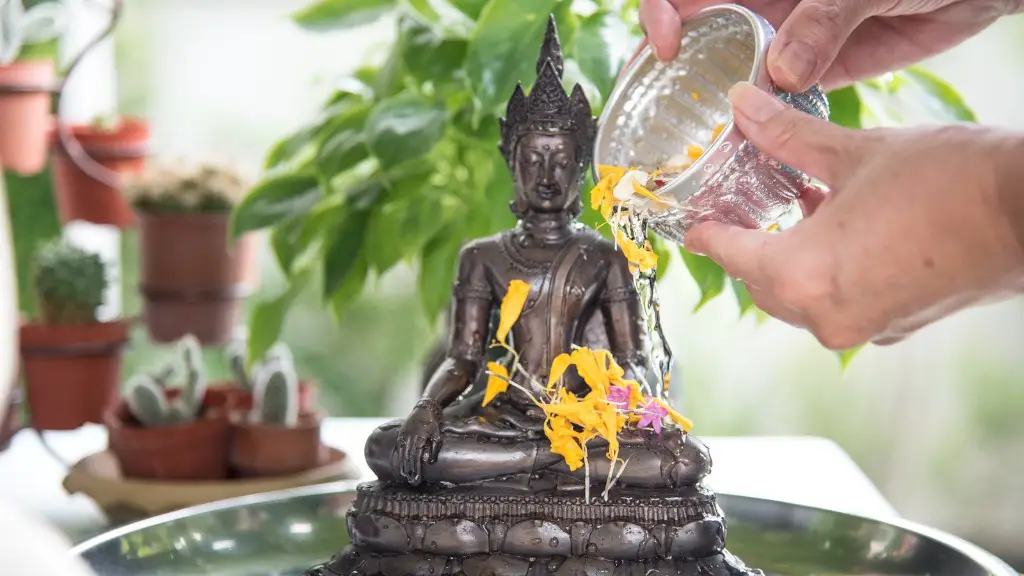How Has Hinduism Survived For So Long?
Hinduism is one of the oldest existing religions in the world, dating back to the Vedas of 1500 to 1100 BCE. It is considered by some to be the basis for the development of all the great religions of the world. Despite its ancient roots, Hinduism has endured countless conquests and cultural shifts over the millennia and still remains widely practiced today. So, how has Hinduism managed to survive for so long?
For one, Hinduism is centred around a belief in the power of karma, or the idea of personal responsibility for one’s behaviour. This means that individuals must bear the consequences of their own choices and must strive for a better life in the future. This enduring concept has allowed Hinduism to be resilient against external forces. Additionally, Hinduism is a very diverse religion, with its teachings and beliefs adapted over time to accommodate new laws, cultures and ideas.
Hinduism’s adaptability has also been part of its continued survival. Hinduism has shaped itself around the particular needs and circumstances of people in local communities throughout India. This has enabled the religion to keep up with the times and remain meaningful to new generations.
The codified nature of Hinduism has also been a major factor in its continuing existence. Hinduism significantly predated the development of Catholicism, for example. This allowed for the large-scale codification of important scriptures that remain relevant today. Such codification has meant that, rather than relying on oral-based stories and traditions, Hinduism was able to stay true to its core values over time.
Moreover, Hinduism has been able to survive due to its commitment to liberal pluralism. It is an open and tolerant religion that allows adherents to practice whatever they choose. This has allowed its followers to grow in numbers and spread their beliefs throughout the world.
Finally, Hinduism has enjoyed a period of resurgence in recent years due to the rise of Hindu nationalism in India. This movement has seen the reinstatement of Hindu values and the promotion of Hindu culture, which has helped to reinvigorate the religion, both in India and around the world.
Resistance to Colonialism
Hinduism has also been able to survive for so long due to its resistance to colonialism. Although there were periods in history where the teachings of Hinduism were suppressed by the colonizers, Hinduism was able to persist due to its own internal strength and resilience. This strength lies in a rich intellectual and philosophical tradition, which has been passed down from generation to generation.
These teachings, combined with a deep-rooted spiritual and cultural heritage, have enabled Hindus to stand their ground against colonialism and maintain their unique beliefs and values. This has also meant that Hinduism has been able to evolve with modern times and remain relevant in today’s society.
Role of Texts
Another factor that has contributed to Hinduism’s long-term survival is the wide range of texts associated with the religion. These texts contain the teachings and philosophies of Hinduism, and as such, provide guidance to its adherents. This has also enabled individuals to practice their faith in new and different ways, while remaining true to the core values of the religion.
Furthermore, the texts have provided access to Hinduism’s teachings to those living in remote parts of the world. By helping to spread the religion globally, the texts have played a key role in helping the religion to survive and thrive for so long.
Importance of Rituals
Hinduism is uniquely said to be a way of life. Thus, daily rituals and practices are integral to its beliefs and enrich people’s experiences of the religion. Such rituals and practices range from shrine visits to traditional ceremonies, and provide a connection to the divine. This in turn unites adherents from diverse backgrounds under one faith.
Similarly, rituals are a source of empowerment. For example, the practice of meditation has been found to reduce stress and enhance well-being. Such ritualistic practices provide an opportunity for devotees to deepen their commitment to their faith and make an even stronger connection with their gods.
Areas of Controversy
Hinduism has not been without its controversies. Over the centuries, it has faced criticism and opposition from academics, religious leaders and political figures. However, Hinduism has been able to withstand such attacks due, in part, to its progressive approach to teachings. Most notably, there is now an increased emphasis on science, innovation and the need for modern reforms.
Moreover, Hinduism attracts adherents from all walks of life. This makes it difficult for opponents to accuse it of having a single, rigid set of doctrines. Therefore, it is able to avoid pressure from outside sources, which has been a major factor in its long-term survivability.
Renewed Interest
In recent years, there has been a renewed interest in Hinduism among the younger generation. This has been largely fuelled by a growing spiritual awakening and the popularity of yoga. As a result, many people are now turning to Hinduism in search of a sense of connection and meaning in their lives.
However, modern-day Hindus are not tied to the practices of the past. Young devotees are actively redefining traditions, blending the traditional with the contemporary, and coming up with their own interpretations of the faith. This allows them to relate to the religion in an authentic and meaningful way, thus contributing to its continued survival.
Modern Challenges
Finally, Hinduism is facing a plethora of modern-day challenges. In India, it is battling the spread of communalism and religious intolerance. Additionally, businesses are taking advantage of the booming spiritual tourism industry, exploiting Hindu temples and selling ‘hindu branded’ products without following the core spiritual principles of the religion.
Regardless, Hinduism is still one of the most subscribed religions in the world. It enjoys a rich and diverse history, and has managed to survive and evolve over centuries. Despite its current challenges, Hinduism continues to adapt, survive and provide spiritual nourishment to millions of people around the globe.

